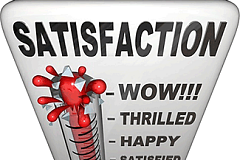IQ (intelligence quotient) and EQ (emotional intelligence quotient) are both important, but in different ways.
IQ is a measure of a person's cognitive abilities, such as problem solving, memory, and critical thinking. EQ, on the other hand, measures a person's ability to understand and manage their own emotions and the emotions of others.
Both IQ and EQ are important for success in life, but in different areas. Someone with a high IQ may excel in a specific field, such as science or mathematics, while someone with a high EQ may excel in social situations and work well with others. It is not a matter of one being more important than the other, but rather both being important in their own ways.
Is Mindset a Result of Your EQ or Separate?
Mindset and EQ are related, but separate concepts. While EQ powers a person's ability to understand and manage emotions, mindset refers to a person's attitude or perspective towards a particular situation or aspect of life.
A person's mindset can be influenced by their EQ, as someone with high emotional intelligence may be better able to understand and manage their own emotions and therefore have a more positive mindset.
However, mindset can also be influenced by a variety of other factors such as past experiences, beliefs, and values. A person with a high EQ may not have a positive mindset and vice versa.
How About IQ?
Someone with a high IQ may not have a growth mindset if they have had a history of being told they are smart and that success is easy for them, leading to a fixed mindset.
Moreover, IQ is not the only indicator of a person's abilities, and someone with a lower IQ may still have a growth mindset and be successful in their endeavors.
Does Either IQ or EQ Affect How You React To Failure?
Both IQ and EQ can potentially affect how a person reacts to failure.
A person with a high IQ may have an advantage when it comes to problem solving and critical thinking, which can help them to find creative solutions to challenges and bounce back from failure. They may be more inclined to analyze what went wrong, learn from their mistakes, and move on.
EQ, or emotional intelligence, is also related to how a person reacts to failure.
People with high EQ are better able to manage their emotions, which can help them stay calm and level-headed when faced with failure. They may be less likely to become overwhelmed by negative emotions such as frustration, anger. or disappointment, which can help them to maintain a more positive attitude and approach towards failure.
However, it's worth noting that both IQ and EQ are each just one aspect of a person; how someone reacts to failure can also be influenced by other factors such as past experiences, beliefs, and values.
Does IQ or EQ Affect Ones View of Failure, Is There Such a Thing As Paralyzed By Failure?
IQ and EQ can affect a person's view of failure, and one’s view of failure can, in some cases, lead to being "paralyzed by failure."
A person with a high IQ may be more inclined to view failure as an opportunity to learn and improve, as they have the cognitive abilities to analyze and understand what went wrong. They may be more likely to see failure as a necessary step towards success and be resilient in the face of it.
On the other hand, a person with a high EQ may be better equipped to handle the emotional challenges that come with failure. They may be better able to manage their emotions and maintain a positive attitude towards failure, which can help them to see it as a learning opportunity.
However, if a person has a fixed mindset or low self-esteem, failure can be a traumatic experience, leading to feelings of inadequacy, low self-worth and to being paralyzed by the fear of failing again. In these cases, both IQ and EQ may not be enough to overcome the negative impact of failure.
It's important to note that failure is a normal and natural part of life, and it's how we react to it that can shape our view of it. Developing a growth mindset, which allows us to see failure as a learning opportunity, can be beneficial to anyone











